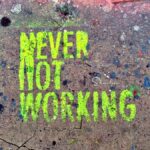As part of a year-end report, Mary Ellen Slayter at SmartBrief on Workforce asked each member of their advisory board to write a blog post about a workforce trend that shaped 2009. When I first got this request, frankly I was a little stumped. There are so many things that have happened this year. But a recent incident really focused my thoughts on the subject.
Mr. Bartender’s Blackberry died so we needed to get him a new phone. He decided to join the ranks of iPhone users…so we went at the AT&T store. (Side note: he ended up getting my 3G and I got the new 3GS!) Anywho, while we were there the store manager was chatting with us and had to quickly excuse himself to take a call. He came back to tell us that his brother (who lives in Pakistan) called him to see if he was affected by the shooting taking place in Orlando.
What? People in Pakistan hearing about a shooting in Orlando before me – a person living in Florida? He turned on the TV and sure enough, the breaking news story is about a guy who shot 6 people in an Orlando office high rise. This immediately gets my attention since my sister works in downtown Orlando. I start emailing her to make sure she’s OK and checking Twitter for details.
The story is being reported as an employee who was terminated for performance. After which his life starts sliding downhill. He gets angry and takes his frustrations back to where he feels the problems started – his former employer. As a HR pro who has had her life threatened, I can tell you this is both a sad and scary situation.
After the suspect was taken into custody and the surviving victims were left to put their lives back into some semblance of order (if possible), The New York Times printed a story about the incident. A quote in the article jumped out at me about what people are going through right now.
“This guy is a compilation of the front page of the entire year — unemployment, foreclosure, bankruptcy, divorce, all of the stresses,” said the lawyer, Robert Wesley, a public defender assigned to represent the suspect, Jason Rodriguez. “He has been declining in mental health.”
My take on the trend for 2009? No, it’s not social media. And, it’s not fixing a profession. 2009 is about working people and survival. Pure and simple.
While I realize the Rodriguez example is an extreme, it’s not naïve to think people are living and working in fear. Everyday. Fear they will lose their job and everything that goes along with losing a steady paycheck. This fear puts people in a survival mentality and creates a defensiveness that’s difficult to move past. Great Leadership blog recently published a post that examines the subject closer…be sure to check it out.
Fear is keeping our employees from being engaged and productive. As managers and leaders in our organizations and our communities, we need to help alleviate the fear. How do we do that? Well, here’s a starter list:
- Conduct ourselves in an appropriate and ethical manner.
- Hold ourselves accountable for our actions. Having a full plate is not justification for treating people badly.
- Teach others how to process change, new ideas and different processes. Being busy is no excuse.
- Communicate on a regular basis with stakeholders, coworkers and staff. Communication is not a luxury; it’s a necessity.
It’s simply not acceptable to wish away the tough messages or dismiss management responsibilities because times are challenging. It’s time to begin accepting personal accountability and start leading.
The working world is becoming a very ugly place. It doesn’t have to be that way. It’s time to change our views about work. Successful organizations will figure out how to make this transition and help their employees make it happen.







Alicia Arenas (@AliciaSanera) says
You hit the nail right on the head Sharlyn. In 2-3 years the market will change and employers who have been mistreating their employees will see their used and abused employees leaving in droves. Doing business ethically and taking care of employees should be automatic. Those who aren’t will pay the price soon. Thanks for a great post.
RMSmithJr says
Sharlyn
Sadly, right on target. I did a 17% RIF this month, right after this incident. Had thoughts of ‘carrying’ that day. Why didn’t I? Workplace culture – we all get along with sincere and authentic caring & compassion. There were tears, hugs and handshakes. My ‘carrying’ thoughts were unfounded. (Plus, I never carry anyways – I would be my own worse fear waiting to happen.)
Pasmuz says
I have been very fortunate to keep my job through the recession. “Indicators” suggest the worst is over. But personally, more people are talking to me about more impending layoffs where they work. I agree, people are definitely living and working in fear. During Naomi Bloom’s keynote speech at the HR Tech Conference, she said, in short, to turn off the bad news. I could not agree more. Yet it is difficult when that news keeps coming through the media and lands at our front door. Talking about the fear that people are having without causing more requires an eloquent touch. I think you mixed the right cocktail on how to handle that fear.
Joe Lavelle says
Sharlyn – Great post! I love how you end with direction that leaders must take personal accountability! I think that followers do as well. Personal accountability while we are still working means doing everything we can to help our companies retain profitability, and if we are laid off it means using every means necessary to become a bread winner again for our family. I recently referenced a great story about a guy who took great initiative to restoring his income. http://actasifblog.com/?p=703 I hope that your readers can enjoy and learn from the story as well!
Best wishes! Joe
@HRMargo Margo Rose says
Building accountability, and trust is rarely easy. Our ethical compass should point us in the direction of right action. When I was an intern, many years ago at The Center for Labor Management Cooperation, I used to develop instructional designs for training programs. Unfortunately, our most sought after program at the time was our series on workplace violence: how to spot it, and how to prevent it. Being an advocate for safety, I believe when we properly recognize and reward employess, we can often de-escalate the cycle before it begins.
We do have to hold people accountable for their actions. But doesn’t it make sense to offer positive redirection first? In my experience some of the people that struggle with accountability don’t have a clear idea of exactly what it is they are expected to accomplish. It is therefore, incumbent upon us to make sure that people understand precisely what it is we expect them to deliver, and offer incentive and rewards for doing so. People will often embrace change when they are fully aware of the positive impact the change will have on their job. Change is growth. I agree that having an effective communication strategy is key. There are organizations who have a closed, or stunted communication mechanism-information fails to flow. There are organization development interventions that can improve and open the communication system–but first we have to recognize that sometimes the lack of communication and accountability within organizations is a systemic problem that may spring for an unhealthy organization culture. Alas, we agree, communication is not a luxury, it is critical for organizational improvement. Thank you for a very well written post.
Sincerely,
@HRMargo Margo Rose http://hrmargo.com
Marsha Keeffer says
A powerful post, Sharlyn. It’s also a heads-up to people in HR to take care of themselves – doing a RIF is horrible.
I’d add that part of leadership is talking with management about the importance of doing everything possible to do only one layoff. Serial situations just increase the fear.
The combined pressures definitely make the potential for workplace violence higher. Keeping the communication going can help provide early information regarding which employees might be at risk.
hr bartender says
Thanks everyone for sharing your comments and experience. Accountability is the key to so much – our personal brand, image and credibility. And, holding people accountable is critical. The organizations and individuals who figure this out will have the respect and trust to be successful.